How to List Skills on a Resume (Real Skill Examples)
This essential resume writing article is about how to list skills on a resume. For more resume writing help, visit our job seeker resource center .
EdgeWater Pharmacy just posted an opening for a Sales Associate right down the street from your home. You think you are the perfect fit for the job, so you submit your resume, but so do 30 other candidates.
Do you know who is going to get called in for an interview?
The job seeker who looks like they have the most relevant skills for the job.
Make sure you’re getting the callback for an interview from a hiring manager by reading how to list your skills on a resume.
This essential job seekers’ guide will walk you through how to add the skills a hiring manager wants to see on your resume, along with 50+ real resume examples of skills you can use.
This article on how to include key skills on a resume covers:
- What are professional skills?
- Why are skills important on resumes?
- Different types of skills for job seekers
- Where and how to incorporate skills on a job application
- Top 50+ skills hiring managers want to see on your resume
- Fastest ways to gain new skills to get hired

What Are Skills? Why Are Skills Important?
According to the Merriam-Webster dictionary, a skill is:
“the ability to use one’s knowledge effectively and readily in execution or performance”
“a learned power of doing something competently : a developed aptitude or ability”
When it comes to job hunting, your skills are what set you apart. Every human on earth has a set of skills that is unique to them. Likewise, every professional position has a unique set of skills that is required for performing the job.
Finding the perfect alignment between these two ideas is the key goal for every hiring manager.
If a hiring manager finds someone that already possesses the skills needed for their job, they won’t have to spend so much time and money on training. It also means that their new employee will be able to pull their own weight more quickly, providing a quicker return on their hiring investment.
But how do hiring managers know who has what it takes to perform well on the job?
The first and most important place hiring managers look is at your resume. On average, a hiring manager spends 6 seconds reviewing a resume and during that time they are scanning the pages to see if the skills required for the job jump out at them.
If they find what they are looking for, you get called in for an interview. If they don’t quickly see what they are looking for, your resume will most likely be discarded.
As a job seeker, it is your responsibility to make sure you know what skills hiring managers are looking for.
Once you identify those skills, it is also your responsibility to make sure those relevant skills are incorporated into your resume in a way that stands out.
If you do these two things accurately, you will be the one getting called in for an interview and will be that much closer to landing a new job.
Types of Professional Skills (Real Resume Examples)
Skills can be broken down into four main categories:
- Hard skills
- Soft skills
- Transferable skills
- Job-related skills.
Before you start writing your own list of skills, let’s go through each of these skill categories to see what the difference between them is.
Hard Skills vs Soft Skills
Hard skills are specific, teachable, and tangible. They can be measured and tested using assignments and assessments. Hard skills are learned, either through on-the-job training or through school, rather than coming naturally.
Examples of hard skills for a resume:
Soft skills are intangible and are harder to measure. They are personality traits and interpersonal skills that come naturally to humans, rather than being learned through school.
People are born with soft skills. These soft skills grow and develop over time from your upbringing, education, and experiences.
Examples of soft skills:
Contrary to popular belief, hiring managers often care more about soft skills than hard skills, though both hard and soft skills contribute to your appeal as a candidate.
Hard skills, such as computer programming or accounting, can be taught using a combination of curriculum and hands-on practice. Whereas soft skills, such as a positive attitude or punctuality, are harder to teach.
Regardless of your background, hiring managers are usually flexible with teaching you the hard skills needed for their job, as long as you already have the right attitude along with the aptitude to learn.
Transferable Skills vs Job-Related Skills
Transferable skills can be carried with you from one job to the other. These skills can be a hard skill or soft skill, as long as they can be used in any type of role, regardless of the industry, company, or position.
Examples of transferable skills:
Job-related skills are usually always hard skills. These job-related skills are specific to a certain type of role or position.
Examples of job-related skills:
How And Where To List Skills On Your Resume
Skills should be included throughout your resume, rather than confined to one area.
While scanning your resume, hiring managers will be looking over each resume section, starting with the top. Because of how people read resumes, you need to make sure they see your skills immediately.
Guarantee hiring managers will see your skills by listing them in four key areas of your resume:
- Resume header
- Professional summary
- Summary of skills
- Work Experience section
If you are writing a resume from scratch, try using this free and easy-to-use resume builder from Resume.com. The sections and formatting are already created for you, so all you need to worry about is filling in the blanks to finish a free printable resume.
1. Resume Header
At the top of your resume, directly below your name, write your job title along with the three most relevant skills you have as a candidate.
This is the first section hiring managers will be reading, so it is important to draw their attention using bold and large lettering.
If you’re using this resume builder , the ‘ Blue Skies ’, ‘ Three Blocks Digital ’, and ‘ van Deco ’ resume templates already have a header section included, which will make finishing your resume easier.
When writing your header, it is crucial that you customize the job title and skills to each job you’re applying for. Your job application needs to be consistent – you can read more about consistency in this article .
For example, if you write Java Developer in your resume header, but are applying for a .NET Developer position, a huge red flag will go up for the hiring manager.
When writing your top three skills in your header, make sure they align with the required skills listed in the job posting.
If you’re applying for a job at a large company or corporation, or you’re applying through a job board, it’s helpful to keep applicant tracking systems (ATS) in mind. Make sure your resume makes it past ATS software by listing your skills using the same wording as the job posting.
Example of skills in the resume header:

2. Professional Summary
Below your header and contact information, you will have a professional summary section. A professional summary used to be called an ‘objective’, but the modern resume writing approach is to replace your objective with a professional summary section.
Your professional summary should give an overview of your background, years of experience, and the top skills that set you apart. The skills in your professional summary should be written in sentence form, rather than listed out.
If using the resume builder , the ‘ My Employment ’, ‘ Apple Green ’, and ‘ Side Panel ’ resume templates have professional summary sections that are sure to draw attention to your most relevant skills.
Example of skills in the professional summary of a resume:

3. Summary of Skills
Below your professional summary, include a ‘summary of skills’ section. Alternative titles for this section could be ‘core competencies’, ‘key skills’, ‘professional skills’, or ‘relevant skills’.
If you have less than 10 skills, you can list them out in columns.
Summary of skills resume example (less than 10 professional skills) :

Summary of skills resume example (more than 10 professional skills) :

For your skills section, your skills should be listed, rather than written out in sentence form. This formatting choice helps hiring managers to pick out the key words quickly, which they can read about in more detail in the experience section after.
4. Experience Section
The ‘experience’ section usually comes after your summary of skills on a resume. Depending on your background, this could also be called ‘professional experience’, ‘work experience’, or ‘relevant experience’.
Your experience section is the perfect place to back your skills up with real-life examples of when you have used your skills, in addition to the results you have achieved.
When writing your experience section, give specific details about where, when, and with whom you have used your skills. When possible, use numbers and metrics to quantify your achievements.
Example of how to list skills in the experience section of a resume:

How to List Skills On A Resume – Finding Relevant Skills For You
To figure out what skills you should include on your resume, follow these three simple steps.
Step #1: Create a master list of skills
Go through each category and create a master list of the skills in your toolbox. Don’t be afraid to list things that seem obvious, like computer skills or customer service.
Although they might seem like a given in your profession, many hiring managers still want to see these skills listed.
Never include skills that you are no longer familiar with. If you write a skill on your resume, hiring managers will be expecting that you can deliver on that activity.
If you are worried that a hiring manager will over or underestimate your level of proficiency, feel free to write ‘beginner’, ‘intermediate’, or ‘proficient’ next to each skill listed.
Step #2: Figure out the skills needed for the job
When applying for jobs, it is important to identify the set of skills that are needed. Picking out the needed skills will help you determine if you are a good fit for the role. It will also help you tailor your resume skills to the specific job you are applying for.
There are two main ways to determine the skills needed for a job.
The first is to dissect job descriptions and job postings that are posted on career websites and job boards. To do this, go through a job description and highlight each quality that describes the candidate the company is looking for.
For example, here is a job posting for a cashier position:
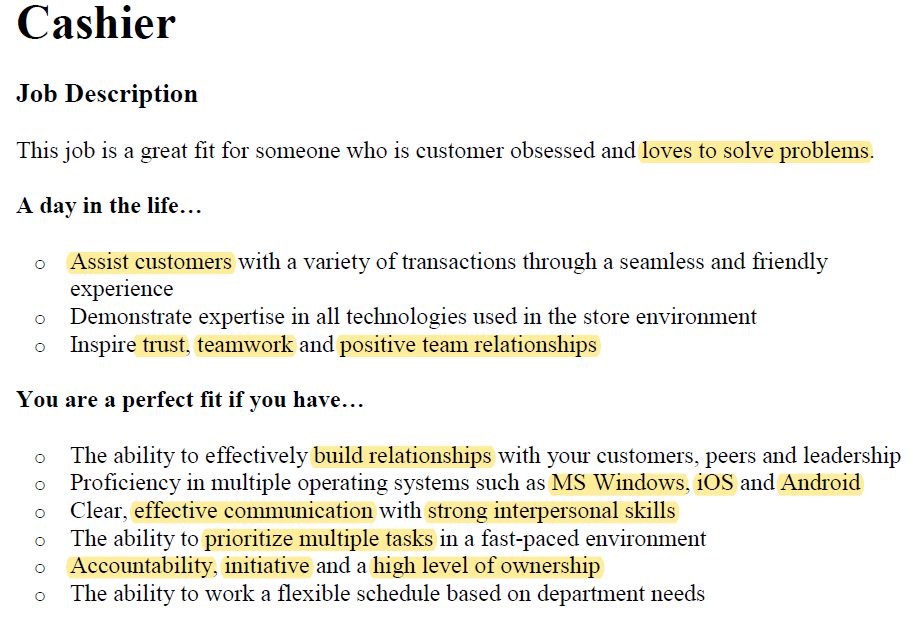
Then create a list of all the qualities described, making sure to write each skill using the same wording that is used in the job posting.
The second way to figure out what skills are needed for a job is to search for people on LinkedIn who are already performing the role.
By searching for a certain job title in the search bar, you can find a list of professionals who are already in that job and then search through their profile to see what skills they have listed, both in their summary and experience sections.
Step #3: Match your master list with the skills needed for a job
The skills you write on your resume should be whatever overlaps between your master list and the list of skills you created from researching jobs.
By using this technique, you will be making sure that the skills you have listed on your resume are relevant to the jobs you are applying for.
A general rule of thumb is to never include skills that aren’t important for the job you are applying for.
For example, if you are applying for a project manager position, there is no need to list that you know yoga or CPR.
Top 50+ Skills Hiring Managers Look For On Resumes
A lot of research has been done as to what hiring managers look for on a resume. Many of the skills they seek are job-specific, while others are transferable.
To increase your chances of getting called in for an interview, include these top skills throughout your resume.
These professional skills are divided by category to help you find the skills that are relevant to you.
Soft Skills
Basic computer skills, customer service, project management, art & design, human resources, fastest ways to obtain new skills.
Are you looking for your first job? Are you missing some of the required skills on a job posting? If so, don’t worry. There are a range of ways for you to obtain the needed skills quickly.
If you are in need of a hard skill, this task is much easier. Hard skills are learned, so you can typically find an online resource, school, or curriculum to pick up the needed skills.
If you don’t have enough time to attend class in person, there are a number of online learning platforms with courses that you can take online, in your spare time. Some examples of popular eLearning platforms include Lynda, Udemy, and Skillshare.
Learning soft skills are a little trickier. These interpersonal and personality traits are hardwired into humans, so the only way to get better at them is to practice, practice, practice.
If you can’t practice soft skills while on a job, try to find some day-to-day activities that you can practice these skills during.
For example, if you need to work on punctuality, set a goal to arrive 5 minutes early wherever you need to be, no matter if it is for class or for coffee. Or if you need to work on your professionalism, pick up a volunteer job based in a professional, office setting.
More Skill-Related Articles For Resume Writing:
- How To List Hard Skills On A Resume (50+ Technical Skill Examples)
- How to List Computer Skills on a Resume (50+ Computer Skill Examples)
What is a Resume Skills Summary, and Should You Include It?

When writing your resume, it's important to think about what you'll say and put it carefully. Relevant experience and skills are a must on the list, but there are other things to add, such as a resume skills summary. Like many job hunters, you may be confused if this would make a good impression. In deciding if you should include this part, you have to bear in mind your goal in the job application process.
What is a Resume Skills Summary?
A resume skills summary is the part of your resume where you show employers the skills you have in your professional life. Remember, you should tailor the skills you want to include to the job you're applying for. Aim to write a resume skills summary that will.
You can also include your career goals and successes in this section. It may tempt you to put in all your skills. But remember to only put what's relevant and mirror what's in the job description.
What to Consider in Writing a Skills Summary?
You should consider several things if you decide to include a skills summary for your resume. The first is whether you're looking for a different job . An upgrade or a better job means you need to showcase your skills to get a shot at what you want. A well-written resume skills summary is a great way to try to achieve this.
The second point to consider is if a resume skills summary will be useful . You'll make your way through a few levels in the job application process, which serve as your audience. The following shows if a resume skills summary will come in handy.
The applicant tracking system (ATS)
The first to screen your resume is a machine or software called the applicant tracking system (ATS). Since a computer generates this, a resume skills summary is a way for you to put in more keywords to match the job you want. The ATS is more likely to pick you when you present more matching keywords. When you pass this test, your resume goes to the recruiter.
The recruiter, hiring manager, and interview team
The next set of eyes to check your resume is a person. Whether your resume makes it to the end, a summary will give the reader an idea of who you are and your skills. It helps the entire team decide if you're worth giving an interview.
Another point to consider in writing a resume skills summary is if you want a similar job . A summary may come off as redundant if it's the same thing found in the rest of the resume. If this is the case, you don't need to include a skills summary for your resume. The same applies if you're a certifiable expert. That's because you're more likely to be doing the same job line or stay in the same industry.
Length is also a key factor in writing a summary of your skills. Limiting the number of characters will make it more compelling and doesn't waste anyone's time. Be clear, direct, and precise. For better results, add energy to show your interest and passion.
Should You Include a Resume Skills Summary?
The decision to write a skills summary for your resume rests entirely on what you're trying to achieve. A summary can help if you want to apply for a different job. It's also great in giving your resume a lift, especially when making its way through the ATS. If you include a resume skills summary, remember to keep it short and simple. To ease some of your stress from job hunting, visit Career.com today.
Supercharge Your Job Search
Select a career advice topic, other articles about resumes, cover letters, thank yous.

4 Must-Know Resume Statistics for Your Job Hunting
5 Benefits of An Applicant Tracking System You Should Know

5 Reasons Why You Have to Send a Post-interview Thank You Letter
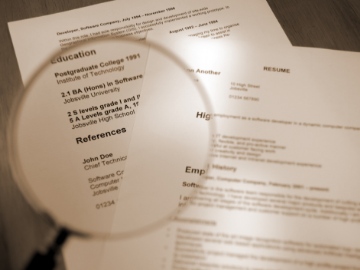
5 Ways How to Write Your Resume Experience Section
100 Good Skills to Put on a Resume [Complete Guide]
Jeff Gillis 0 Comments

By Jeff Gillis
Updated 6/4/2022.

When you’re adding skills to a resume, you don’t just want to focus on what you’re good at. Instead, relevancy has to be part of the equation. After all, every job you’re trying to land requires a very specific skill set, one that you need to show that you have.
Choosing the skills to put on a resume when you’re applying to a role isn’t something you should do haphazardly. Instead, you want to use the job description, company mission, and company values as a guide, creating a sense of alignment.
Additionally, it never hurts to have a handy list of skills by your side, making it easier to explore your options. So, if you’re on the hunt for good skills to put on a resume, here’s what you need to know.
Hard Skills vs. Soft Skills
There are two basic types of skillsets that a job seeker can have and include on their resume: hard skills or soft skills.
Hard skills are the skills or abilities for a resume that are easily quantifiable…that can be learned through classroom work, apprenticeships, or other forms of learning. These include things like operating tools, computer programming, speaking foreign languages, or different kinds of technical prowess.
Soft skills are more subjective and harder to quantify and are often grouped together by what we know as “people skills.” Some examples of soft skills include communication, relationship building, self-awareness, and patience.
Which Skills Are More Important?
The debate rages on about which of these two types of skills is more important.
According to executive consultant and Forbes contributor Naz Beheshti , “…There is an ongoing debate about the relative importance of soft and hard skills that imply a competition between the two. However, they are both necessary and complementary to one another.”
On the one hand, job seekers with proficiency in a specific hard skill may get hired more quickly. Many employers want to hire people that can deliver value with fewer resources (ex., the need for training, etc.), making hard skills their priority.
However, we are also seeing that many hiring managers are choosing to hire candidates with highly developed soft skills.
In the end, as Indeed puts it, “soft skills are necessary to create a positive and functional work environment.” Plus, hiring managers feel that they can always train the candidate in the hard skill that is required to complete the job, but soft skills are often skills that cannot necessarily be taught.
So, what does this mean for you? Mainly that you can’t simply just pick one or the other and cross your fingers. Instead, the best strategy is to take a balanced approach and make sure that your resume contains both hard and soft skills.
How Do You Choose the Skills to List on a Resume?
Here’s the deal; there’s a good chance you know what you’re good at in a professional sense. Often, you can use your experience, duties, training, and education as a guide, giving you a strong foundation. Then, it’s about diving a bit deeper, looking at traits that could help you stand out, and comparing it all to the job description.
By using a simple process, you can make progress faster. Here’s a quick way to get started.
1. Make a List of the Skills You Know You Have
As mentioned above, the easiest way to get a grip on your current skills is to reflect on your academic and professional experiences. Consider the tasks you’ve taken on, the training you’ve completed, and the courses you had in school. In most cases, that’ll give you some solid ideas about your hard skills.
After that, it’s time for soft skills. Here, you want to think of traits or capabilities that help you engage with others and navigate professional relationships. Often, these are reflections of your personality, so use that as a jumping-off point.
2. “Mine” the Job Descriptions for Must-Have Skills
The next step is to take a look at the job description for the position you are applying for and make a list of the required skills it includes. Then, compare it to your capabilities. Are any of the skills on both of the lists you just created? If so, these are must-haves for your resume.
Now, notice if there are any skills on the job description that you don’t have. If there aren’t any, great!
But if there are…don’t panic. There are things you can do, which we’ll dig into shortly.
If you’re dealing with a vague job description, you aren’t stuck either. Here is a link to a ton of job descriptions that can give you an idea of the skills needed.
3. Tailor Your Skills to the Company/Position
As you may have read in our other blog articles, it is always very important to “tailor” your resume to the company and position you want to land. For an in-depth look into how to make that happen, check out our Tailoring Method article.
If you want a quick overview, the idea is to focus on capabilities the company wants to find. Every job requires a unique skill set, and you want to show you have it. As a result, it is absolutely essential that skills from the job description make an appearance on your resume.
However, you also want to dig deeper. Spend some more time researching the company, including going through all of their various web properties, such as Facebook, Twitter, and YouTube pages.
Why? Because they will leave clues about the types of people they hire. That gives you more ideas about the best skills to put on a resume to land a job there, particularly when it comes to soft skills you may not find in a job description.
100 Resume Skills Examples
If you’re struggling with coming up with a list of skills based on your past experience, it can be easier if you have existing resume skills lists to work with. You don’t have to think up every possible skill; you can simply review the list and find the matches.
Here is a list of resume skills examples, divided into hard skills and soft skills, that you can use when applying for a job.
Hard Skills for a Resume
- Advanced Bookkeeping
- Appointment Setting
- Automotive Repair
- Cold Calling
- Computer Programming
- Conversion Testing
- Copywriting
- Customer Engagement
- Customer Service
- Data Analysis
- Digital Marketing
- Electrical Engineering
- Environmental Cleanup
- Forklift Operating
- Graphic Design
- Heavy Machinery Operation
- Installation
- Landscaping
- Mathematics
- Medical Coding
- Paid Online Traffic
- Patient Care
- Photo Editing
- Picking and Packing
- Project Management
- Schedule Management
- Search Engine Optimization
- Server Maintenance
- Social Media
- Spanish Fluency
- Statistical Analysis
- Systems Analysis
- Technical Support
- Telecommunications Systems
- Travel Booking
- Video Editing
- Website Design
- Word Processing
Soft Skills for a Resume
- Accountability
- Active Listening
- Adaptability
- Brainstorming
- Business Etiquette
- Collaboration
- Communication
- Conflict Resolution
- Contextualizing
- Critical Thinking
- Decision Making
- Emotional Intelligence
- Flexibility
- Goal-Setting
- Handling Pressure
- Influencing
- Insightfulness
- Interpreting
- Negotiation
- Open-Mindedness
- Organization
- Prioritization
- Problem Solving
- Relationship Building
- Reliability
- Resource Management
- Responsibility
- Self-Confidence
- Strategical Thinking
- Strong Work Ethic
- Time Management
What If I Don’t Have the Required Skill?
Whether you need to possess a specific skill depends on the job and the skill in question. Usually, here’s where you have to be honest with yourself. If the skills required are part of the core competencies of doing the job, you may want to reconsider your application.
For example, if a golf course posts a job posting for a golf pro, you probably shouldn’t apply if you’ve never swung a golf club.
However, you will come across situations where what you bring to the table is close. In this case, moving forward might be okay.
You need to be able to demonstrate, using examples from your past, that you are capable of doing the required skill, even if you haven’t specially done it. So, go over your work history with a fine-tooth comb and try to come up with a few examples of you doing something in the right ballpark.
They are going to ask about it in your interview, so don’t think you can just wing it, and everything will be fine.
Also, many job descriptions have “nice-to-have” skills on the list. If you happen to possess them, great. But if not, don’t assume you shouldn’t apply if you have the must-have skills. In the end, those capabilities aren’t outright requirements, so don’t screen yourself out based on them.
How To List Skills on a Resume
There are a few different schools of thought when it comes to deciding where to put (or how to list) the skills on your resume.
According to our friends over at online resume-builder Zety.com , “…skills are so very, very important that they should show up all over your resume. Not just in the resume skills section.” In other words, it is imperative that there are elements of your skills throughout your resume, including your resume objective/summary and experience sections.
In addition, there isn’t one right answer for where to include your skill section because that depends on the industry, company, and position you’re trying to land. For example, for a job where technical competencies are of the utmost importance, it is often beneficial to list the skills closer to the top of the resume, right underneath the resume objective or resume summary statement.
However, if through your research you determine that the hiring manager will put more weight into your experience, you may want to lead with your experience. Then, put the skills section further down your resume.
At the end of the day, the selection of the skills themselves is the most important thing. After all, most hiring managers will easily find your skill section regardless of where it is on your resume.
What About Skills for My Job Application?
When you’re looking for skills to put on a job application, you do have to treat it a little differently than skills for a resume. Usually, you’re working with a finite amount of space on an application, not just in an overall sense but in each applicable section.
Since that’s the case, you need to lean heavily on the job description. Look for any capabilities that are listed as must-haves or that are repeated through the job ad. Then, make sure those skills are featured prominently in several areas, including in work history descriptions and skills areas.
If you have to answer essay questions, discuss those skills there, too, whenever possible. Use any other relevant capability as a supplement, treating it as supporting information instead of the primary point you’re sharing.
However, if an essay question asks about a skill that’s not in the job description, feel free to dig in a bit. It’s a capability that’s clearly on the hiring manager’s mind, so touch on it occasionally to show you shine in that area.
Putting It All Together
If you were wondering, “What are some good skills to put on a resume?” you should now have a solid answer. The most important thing to remember is to select skills that are relevant to the position you are interviewing for and, more important than that, skills that your company puts a tremendous amount of value in.
Once you get your skills straightened out, you should make sure that the rest of your resume is congruent with the skills you just selected, namely, that your experience shows that you both used those skills in a work environment and developed the skill with on-the-job tasks.

Co-founder and CTO of TheInterviewGuys.com. Jeff is a featured contributor delivering advice on job search, job interviews and career advancement, having published more than 50 pieces of unique content on the site , with his work being featured in top publications such as INC , ZDnet , MSN and more.
Learn more about The Interview Guys on our About Us page .
About The Author
Jeff gillis.

Co-founder and CTO of TheInterviewGuys.com. Jeff is a featured contributor delivering advice on job search, job interviews and career advancement, having published more than 50 pieces of unique content on the site , with his work being featured in top publications such as INC , ZDnet , MSN and more. Learn more about The Interview Guys on our About Us page .
Copyright © 2024 · TheInterviewguys.com · All Rights Reserved
- Our Products
- Case Studies
- Interview Questions
- Jobs Articles
- Members Login

Build my resume
- Resume builder
- Build a better resume in minutes
- Resume examples
- 2,000+ examples that work in 2024
- Resume templates
- 184 free templates for all levels
- Cover letters
- Cover letter generator
- It's like magic, we promise
- Cover letter examples
- Free downloads in Word & Docs
30 Resume Summary Examples + How to Write One in 2024
- Understand the Resume Summary
- When to Use a Resume Summary
- How to Write a Summary
- 30 Resume Summaries
- Resume Summary Recap
It’s the backbone of your job hunt, but it can be frustrating to figure out what goes into a good resume .
And one of the murky areas that hopeful applicants wrestle with is whether to include a summary or objective statement in their resume. When every bit of space on your resume is invaluable, how do you know when a summary or objective is essential?
If you’re already a pro, head to our easy-to-edit resume tool to build your resume before moving on to making a cover letter , or you can customize the resume below. Otherwise, join us, and we’ll clear away the confusion and give you 30 summary statement examples you can make your own.
Real Estate Agent Resume
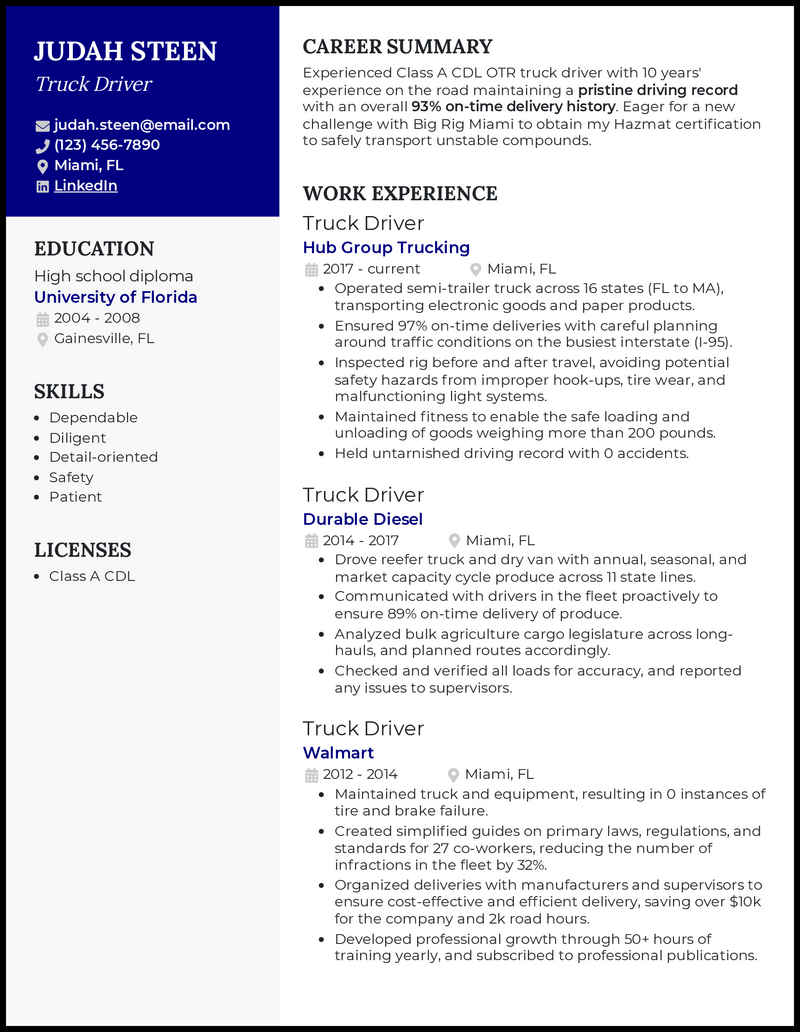
What is a Summary on a Resume?

The summary of your resume should give a quick “snapshot” of your best qualifications, which you’ll later emphasize and quantify with your skills and experience. Your summary offers an overview of which qualifications make you the perfect fit for the job: So, focus on the highlights of your career.
You want your summary to emphasize your history of accomplishments and excellence , leveraging that information to demonstrate how you’ll benefit the company and enhance the position for which you’re applying. Your summary should be attention-grabbing and immediately show why you’re the ideal hire!
Is a resume summary the same as a career objective?
You may wonder whether a resume summary and a career objective serve the same purpose—and whether they’re interchangeable. There’s plenty of overlap between resume objectives and summaries, thus muddling the waters.
These key differences will help you simplify and clarify a confusing topic:
Summaries are great if:
- You have extensive, quality experience
- You’re staying within your field or branching out to something similar
- You have some impressive metrics to share
Objectives are better if:
- You’re a new graduate
- You’re changing careers or breaking into the field
Wait! Is the summary the same as a summary of qualifications?
The lesser-known summary of qualifications is not quite the same as a resume summary! While your summary should describe your qualifications and relevant history in a couple of concise sentences, a summary of qualifications is more technical and usually presented in a bulleted list. The summary of qualifications lets you work in some ATS-friendly keywords and then dazzle a recruiter with metrics, accomplishments, and skills.
It’s usually recommended to keep your list of qualifications to three to six bullet points, limiting each to one or two lines. But this format eats up space on your resume quickly! So, it’s best to replace your resume’s summary or objective with a summary of qualifications if you have a long, complicated history of experience in your field and need to emphasize the highlights of your background at a glance.
Know When to Use a Resume Summary

A resume summary is often best suited to applicants with 10+ years of experience, although standalone accomplishments can be equally powerful .
If you’ve achieved an unusual level of expertise or racked up an impressive list of accomplishments during a shorter time, consider including a summary!
Our simple free resume templates make it easy for you to add or remove information and manipulate sections for personalization without affecting the overall layout of your resume. If you work with a resume template through a word-processing program, like the creative Google Docs resume templates we designed, making edits can throw everything off kilter, often causing you to start from scratch to correct the problem.
Indicators that a summary would fit nicely on your resume:
- You’ve worked long enough (10+ years) that you should condense the highlights of your career
- You have an eye-catching list of accomplishments and quantifiable achievements
- You’ve worked with big-name companies or prestigious projects
- You’ve advanced quickly within your field during an unusually short time
If the list above feels intimidating, circle back to the original question of whether a summary enhances your resume.
Indicators to exclude the summary & let your skills & experience speak for themselves:
- You’re a new graduate who hasn’t had time to build much experience
- Your previous work experience has been somewhat run-of-the-mill
- Your background and qualifications look somewhat generic or bland once written
- You haven’t had many opportunities that resulted in quantifiable achievements
If you can relate, your resume will be strongest if you drop the summary entirely. Instead, lead with your skills and emphasize dependability, ambition, and potential in your experience section.
How to Write a Resume Summary
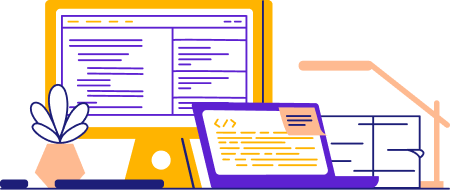
If you’re bracing yourself for the process of honing your summary, don’t worry! It’ll be a breeze if you follow our tried-and-true formula and keep our handy tips in mind as you write.
Follow our resume summary formula
The process is as easy as: X + Y + Z = Attention-snagging summary!
X = Your characteristics and personality traits Y = Years of experience and quantified success/results Z = How these results apply to the specific job role
Consider this resume summary for a programmer:

You can pinpoint each element when you break this summary down:
X = Inquisitive, driven, and eager Y = 8+ years of experience, a client base of 100+ people, and a savings of 725+ manual hours Z = Specific programming skills like Python and jQuery that will enhance performance within the position
Our best resume summary tips
Now, we’ll unpack some tips to help you nail down the perfect summary to jumpstart your resume:
- Summary length: Limit your summary to two or three sentences.
- Keywords: Consider job-specific keywords that the ATS scans for as well as keywords that will hook recruiters.
- Quantify your claims: When you list accomplishments and achievements, back them up with hard facts! Data like improvement percentages, customer satisfaction metrics, and client base numbers will boost your credibility.
- Tailor summaries to specific positions: You never want your summary to feel generic, so look for specific requirements in the job description that you can respond to with relevant details from your own experience.
- Grammar and mechanics: Proofread carefully for spelling and punctuation errors, and keep a close eye on grammar. It’s also ideal to avoid informal contractions and opening sentences with “I.” Your summary should immediately spotlight your professional value—so keep sentence structure concise and use “my” when presenting your skills.
Don’t worry if this is a little overwhelming at first glance! Save your summary for last, even though it appears first. Once your other sections are fine-tuned, it’ll be easier to pinpoint choice details to fill in the formula and complete your perfect summary. (And who says you have to nail your summary the first time you write it?! Go through as many iterations as you need when you outline your resume .)
The good, the bad, and the ugly resume summary
So, what do these concepts look like in action? Take a look at this example of an excerpt from a digital marketing manager’s job description:
As a digital marketing marketer, you will plan, oversee, manage, and implement our brand’s digital marketing campaigns. You will:
- Plan each digital marketing campaign and delegate tasks in a team setting
- Oversee and evaluate the quality of digital marketing materials
- Analyze campaigns and identify how to improve performance
What kind of summary works for this job description? We’ll take it from bad to best.
I graduated with a marketing degree last year and did lots of group projects. I know how to structure a market campaign and read analytics.
Why it’s ugly: There’s zero personality here. The claims are not only weak and vague, but there’s nothing quantifiable to back them—let alone any indication of managerial skills. Even though the summary addresses some details from the job description, they’re too generic.
My degree in marketing makes me a great fit for this position. I can use my communication and analytical skills to help your team create great ad campaigns. I’m also familiar with Google Analytics and LinkedIn and have worked with several teams.
Why it’s bad: While this summary addresses skills and teamwork experience more effectively, the tone still lacks the gusto that most managerial roles require. The first sentence takes up space while offering too little information, and the second two are redundant and unenthusiastic.
Ambition, creativity, and a BA in marketing empowered me to gain 6+ years of experience with a digital marketing team and boost website traffic by 67%. My proficiency in Microsoft Excel, SEO, and KPI tracking enable me to plan, create, and analyze advertising campaigns. My well-honed strategies and communication skills will elevate Nestlé USA’s marketing team to new heights.
Why it’s best: This summary completes the formula! You can see personality, experience, and quantifiable claims coupled with the applicant’s skills that fit the exact job description. Dynamic, powerful verbs such as “boost,” “create,” and “empowered” also suggest this applicant is qualified for an advanced role.
30 Resume Summary Examples to Inspire You + Why They Work

You’ve got the basics down; now you’re ready to take inspiration from these 30 professional resume summary examples across different professions. As you check them out, keep our key formula in mind. Before you know it, you’ll have a starting point for your own incredible summary.
We begin many of these with a quick list of key points in the job description, so you can see how each summary is carefully customized to the role.
1. Accountant resume summary
Accountant job description key points :
- Adept at creating and managing financial documents
- Maintaining ledger entries and monthly budgets
- Detailed error checking and problem-solving
- Auditing and document collection
- Mentorship and training skills
Accountant resume summary :
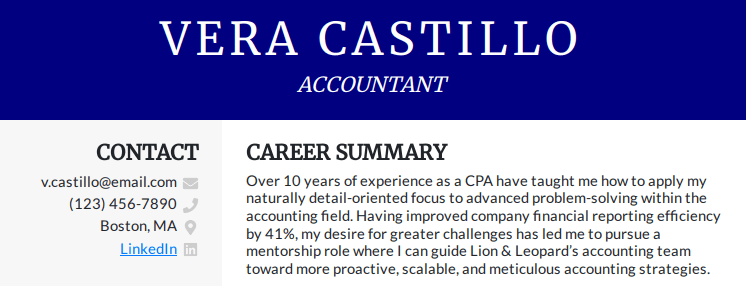
Why this resume works
- The applicant’s ambitious yet matter-of-fact personality is evident in a way that reinforces their desire to take an active leadership role in the accounting field.
- The solid metrics of a CPA certification and an improvement percentage also quantify the applicant’s selling points.
- And lastly, the focus is on more advanced skills instead of entry-level basics.
Need more help? Our accountant resume guide and accountant cover letter examples have you covered from top to bottom.
2. Attorney resume summary
Attorney job description key points :
- Adept with communication and navigating client consultations
- Familiarity with litigation and a strong ability to adapt to changing legislation
- Strategic, analytical thinking, and strong ethical problem-solving skills
- Preparing, customizing, and checking legal documents
- Forewarning clients of potential obstacles and helping them understand their options
Attorney resume summary :

- The candidate immediately demonstrates an ambitious personality alongside a quantifiable accomplishment.
- Next, the more in-depth set of abilities highlights a well-rounded approach to legal success—ending on a strong note with specific examples of how they’ll benefit the law firm.
If you need more guidance on your attorney resume or attorney cover letter , we can show you the way regardless of your experience level.
3. Business analyst resume summary
Business analyst job description key points :
- Analytical and quick, adaptive thinking patterns
- Basic IT abilities in Microsoft Excel, SQL, Google Sheets, and Agile Development
- Superior communication and interpersonal/soft skills
- Meticulous attention to detail with an ability to deliver precise reports/data and advice
Business analyst resume summary :

- The formula is all here—personality with a spotlight on skills that apply directly to the job position—and the applicant dives right into measurable achievements.
- While technical skills are touched upon, broader qualifications and personal traits that mesh with the company take the spotlight.
Take your career documents to the next level with comprehensive guidance on your business analyst resume and business analyst cover letter .
4. Customer service resume summary
Customer service job description key points :
- Impeccable communication, critical thinking, and conflict resolution skills
- Flexibility, adaptability, and reliability
- Task organization and prioritization
- Personable and an affinity for welcoming customers/patrons
- Basic technical/computer skills while monitoring metrics and applying them to better meet company goals
Customer service resume summary :
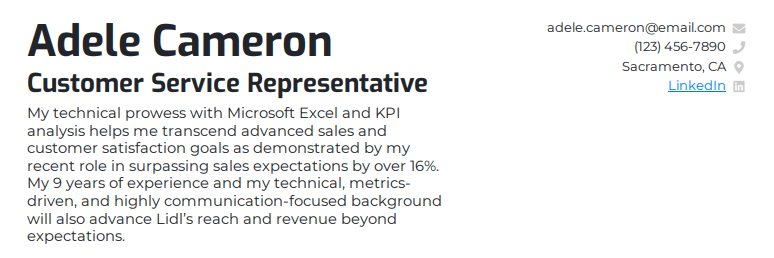
- This summary would be ideal for a candidate looking to progress to a more managerial customer service role since it offers quantifiable results alongside a strong demonstration of a go-getter personality.
- The applicant also included their experience alongside relevant skills, finally tying everything in with the specific company’s goals.
If you’re building your resume for the first time, glancing through our customer service resume guide will steer you in the right direction before you transition to your customer service cover letter .
5. Data analyst resume summary
Data analyst job description key points :
- Analytical and strategizing skills
- Strong ability to identify trends and problems quickly
- Organization, planning, and communication
- Collaborative and team-based abilities
- Technical database management and basic understanding of key languages like Python and Oracle
Data analyst resume summary :

- A data analyst’s job is highly technical, so it’s ideal to dive right into metrics and list several hard skills in your summary.
- While you can still find personality traits and evidence of soft skills in a team setting, this summary is more focused on measurable, results-driven improvements that the applicant can provide.
You’re in good hands (this is not a plug for Allstate, by the way) with our data analyst resume guide if you need some solid examples. Chances are you’ll need a data analyst cover letter to go with your resume; we’ve got that handled, too.
6. Data engineer resume summary
Data engineer job description key points :
- Technical skills like database and development programming languages
- Strong ability to develop, optimize, and maintain database software
- Attention to detail, problem-solving, and communication skills
- Advanced understanding of data pipelines and infrastructures
- Adaptive ability to support stakeholders and executive teams’ data infrastructure needs
Data engineer resume summary :

- As a data engineer, this applicant emphasizes leadership qualities, showing a desire for advancement with metrics to corroborate previous accomplishments.
- You can also see technical skills presented strategically to demonstrate the applicant’s skills in light of the job description.
Start your data engineer resume with the right resume template that speaks to you and your dream role. Besides a resume summary, know what else requires good writing? Yeah, your data engineer cover letter .
7. Data scientist resume summary
Data scientist job description key points:
- Second-nature understanding of the Scientific Method and algorithms
- Advanced ability to organize unstructured data and information
- Clear communication alongside translating large volumes of data into easily-comprehensible business insights
- Improve data quality and streamline/implement pricing models
- Integrate stakeholder input and collaborate on constant, adaptable business model improvements
Data scientist resume summary :

- This applicant demonstrates a driven personality with a highly analytical mindset and scientific background.
- You also get a realistic idea of how they’ll use their skills to produce quantifiable results—and benefit the company.
Looking for more resources? We can help you with the entirety of your data scientist resume and help you understand the nuances of writing a data scientist cover letter .
8. Graphic designer resume summary
Graphic designer job description key points :
- Attention to detail and a solid understanding of design theory for both print and digital applications (colors, typography, shapes, composition, etc.)
- Technical expertise with digital illustration/editing programs
- Understanding of marketing strategy, advertising techniques, and social media
- Excellent communication with clients and team members
Graphic designer resume summary :
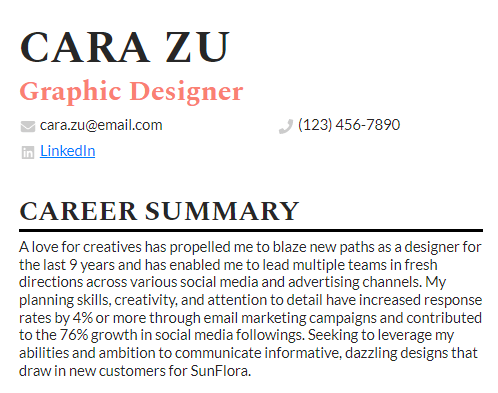
- The candidate’s bright personality shines here, quite impactful for a creative field when backed by quantifiable examples of success.
- Teamwork abilities and experience with digital marketing also take center stage, demonstrating a balance between creativity and organized planning.
Choose a well-designed resume template for your graphic designer resume , and find a matching template to boost your confidence when it comes to your graphic designer cover letter , too.

9. Human resources (HR) resume summary
Human resources (HR) job description key points :
- A knack for facilitating communication between peers and departments
- Ability to update company policies, benefits, employee records, and payroll
- Proactivity when it comes to helping employees understand company policies
- Performance reviews, conflict resolution, de-escalation, and corrective action
- Assist with managing meetings and fostering employee communication and trust
Human resources (HR) resume summary :

- Soft skills are important in HR, especially when addressing sensitive topics, so this applicant’s focus on the personal side of company policies is wise.
- Even so, they still supply a strong metric for previous success and specify how their traits would fit the job position.
Don’t miss our complete HR cover letter guide , and we share what works and what doesn’t on the rest of your human resources (HR) resume .
10. Nursing resume summary
Nursing job description key points :
- Fast, effective communication and task implementation
- Collect patient data such as medical history, current conditions/medications, and updates
- Critical thinking and decision-making abilities regarding when to treat patients vs. when to consult doctors/supervisors for guidance
- Organizational skills and ability to interpret patients’ information, adhere to treatment plans, adjust treatment plans as needed, and administer medications
- Tactfully and kindly discuss care options with patients and families
Nursing resume summary :
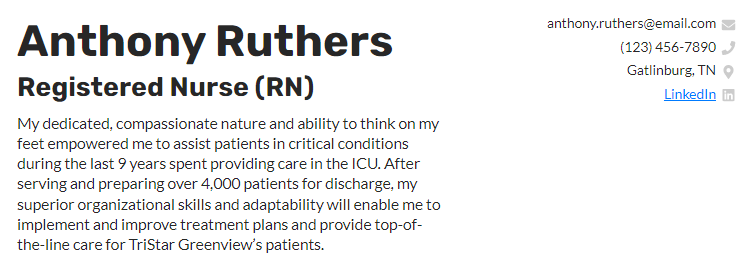
- This candidate’s caring, clear-headed personality shines, and they provide an empirical metric for their experience.
- Additionally, you can easily find specific examples of crucial skills that will help them perform efficiently in any fast-paced nursing position.
The roles are endless when it comes to the medical field, so make sure you’re on the right track with your nursing resume as well as when it comes to writing your nurse cover letter .
11. Operations manager resume summary
Operations manager job description key points :
- Excellent leadership and administrative capabilities
- Analytical thinking and organizational skills
- Ability to manage communication and efficiency among departments
- Adept at hiring, training, and optimizing schedules for employees
- Oversee/analyze production methods, performance, quality assurance, and related data, relying on Salesforce and Tableau
Operations manager resume summary :

- The applicant’s focused and driven personality is evident in the way they immediately showcase their lengthy experience and various aspects of their managerial prowess!
- You also see a success metric right away alongside technical skills aligned with the job description.
Your operations manager resume is sure to shine when you consider our top resume tips ; then, you’ll be primed to write your operations manager cover letter .
12. Product manager resume summary
Product manager job description key points :
- Strong ability to analyze product quality from manufacturing to end-of-life
- Firm understanding of company goals and the ability to align products with those goals
- Superior communication and collaboration among cross-functional teams
- Skillfully interpreting data from Google Analytics and various other sources, leveraging it for improved production/distribution strategies
- Ability to analyze KPIs and identify areas for improvement
Product manager resume summary :

- As with any management-focused job description, the emphasis on strategizing and collaborative analysis here are ideal—and the technical skills balance out the interpersonal abilities well.
- The quantifiable improvement in feedback also strengthens this summary!
Our product manager resume guide will ensure your resume is in tip-top shape from resume summary to resume format . If you’re resume’s already a success, don’t forget about your product manager cover letter .
13. Program manager resume summary
Program manager job description key points :
- Planning, initiating, and implementing plans to achieve company goals and complete project portfolios
- Excellent management, leadership, and communication
- Proactively motivate a team to carry out program activities
- Budgeting, organizational, and strategy-building skills
- Ability to analyze metrics of program success, such as KPIs and satisfaction rates, to identify areas for improvement
Program manager resume summary :

- Talk about detail! We can see several metrics here coupled with an energetic and goal-oriented personality.
- Additionally, these metrics and traits skillfully imply the exact set of abilities this job position requests.
Sail through the rest of your program manager resume , and don’t forget to check it against our AI-powered resume tool before you draft the perfect program manager cover letter .
14. Project manager resume summary
Project manager job description key points :
- Excellent team management skills and a strong ability to facilitate collaboration and team cohesion
- Creativity and adaptability in project planning, budgeting, and implementation
- Ability to bridge the gap between project teams and company executives or clients to provide updates and results
- Organization, time management, and attention to codes and policy compliance
- Skillful preparation and management of briefing materials, progress tracking, and reports/reviews that can be leveraged for future improvements
Project manager resume summary :

- This job role is all about results, so leading with personality traits and metrics that support the candidate’s ability to yield these results is ideal.
- Accentuating what the applicant can offer this particular company is also a great move!
PMs, we see you! Peruse our project manager resume examples for support and inspiration, and sail through your project manager cover letter , too.
15. Recruiter resume summary
Recruiter job description key points:
- Excellent soft skills, including strategic communication. Ability to foster positive relationships with both applicants and staffing agents while managing client and candidate expectations
- Ability to gather information and quickly assess candidates
- Efficiency under pressure when working with high-priority or time-sensitive hires
- Strong ability to gauge talent/potential during interviews
- Develop/update job descriptions, requirements, proposed pay, and benefit plans
Recruiter resume summary :

- This summary concisely highlights the blend of personality traits and interpersonal skills that this applicant offers.
- The candidate still supplies a quantifiable example of their success and relevance, too.
You know all about the job hunt, but we get that you need help with your recruiter resume , too. When it comes to writing a resume or your recruiter cover letter , we’ll share all we know.
16. Sales resume summary
Sales job description key points :
- Effective communication, persuasion, negotiation, and people-reading skills
- Ability to answer/field questions or find information quickly
- Time management and organization skills
- Preparing sales contracts, reports, and presentations
- Following up to ensure customer satisfaction, obtain payments, or promote new plans, services, or products
- Understanding and furthering company programs and specific sales objectives
Sales resume summary :
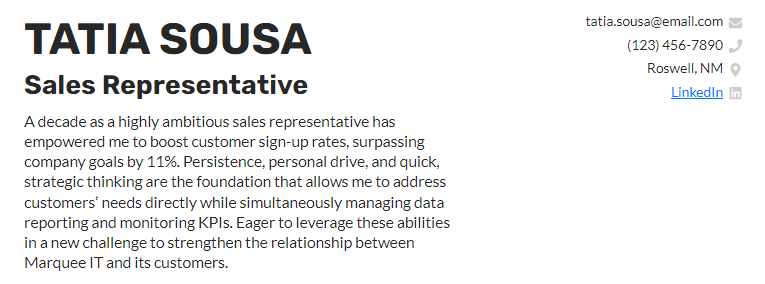
- You can witness plenty of beneficial personality traits here!
- Plus, the candidate’s experience is evident in the skills they highlight—and they specifically speak to the value they’ll offer the company.
Sell your career documents and snag your dream role with our resources for your sales resume and sales cover letter .
17. Scrum master resume summary
Scrum Master job description key points :
- Excellent ability to lead, communicate, and collaborate with a team to meet goals while maintaining Scrum values
- Thorough understanding of Agile frameworks and ability to coach teammates in Agile
- Adaptability in fixing errors and problem-solving with strong recovery skills to keep the focus on sprint goals
- Use metrics and stakeholder/team feedback to ensure optimal product quality
- Organization, coordination, and task prioritization
Scrum Master resume summary :
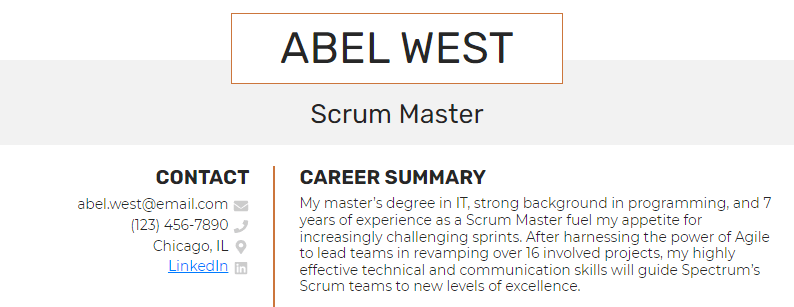
- We clearly see experience, educational, and technical qualifications here.
- Personality shines through while demonstrating a clear understanding of the job role and, of course, everything ties in with the target company at the end.
Scrum Masters, we know you appreciate a logical and organized approach, so start by exploring our resume examples and diving into what works on the best Scrum Master resumes . We can also teach you how to tackle your Scrum Master cover letter with ease.
18. Social media manager resume summary
Social media job description key points :
- Familiarity with social media platforms like Instagram, Facebook, and Twitter, and the ability to maintain responsiveness on all channels
- Quick adaptability to changing social media/market trends and current events
- Adept at monitoring KPIs, SEO performance, and other metrics and assessing the effectiveness and potential improvements
- Ability to collaboratively plan and implement campaigns by creating, posting, and managing original content with the use of Hootsuite
Social media manager resume summary :

- It’s all there—experience, an ambitious, confident personality, credibility-boosting metrics, and highly relevant skills.
- The applicant also provides compelling insight regarding their approach to the company’s success.
As a social media guru, you have an eye for details, which is why you’ll appreciate our free and creative Word resume templates as you finish building your social media manager resume and writing your social media manager cover letter .
19. Software engineer resume summary
Software engineer job description key points :
- Engineering-focused educational background in math or computer science
- Technical experience with tools like C++, Java, Unix, database and cloud storage, etc.
- Strong ability to navigate, explain, and lead the entire software development lifecycle
- Solid understanding of the best software engineering practices with a focus on scalability, quick problem-solving, and information management
- Application infrastructure and design skills that mesh well with speed/optimization
Software engineer resume summary :

- There’s tons of personality here along with strong metrics that demonstrate the applicant’s skills.
- And while there’s a clear mention of technical skills, the strategic thinking of an engineer takes the spotlight, showcasing the ability to expertly handle advanced roles.
If your software engineer resume needs a facelift, consider one of our free resume templates . Remember that your software engineer cover letter can make a great first impression.
20. Teacher resume summary
Teacher job description key points :
- Supervisory and communication skills with the ability to process student feedback and customize lesson plans
- Ability to maintain leadership of the room and engage students with lessons
- Planning and preparing lessons, assignments, and educational materials
- Updating grades frequently, providing thoughtful feedback, and modifying work for struggling students
- Provide insight, advice, and encouragement regarding students’ future career paths
Teacher resume summary :

- The conversational yet professional tone is ideal for a teacher delineating a diverse and adaptable skillset and backing it up with a quantifiable metric.
- The applicant’s best traits practically demonstrate themselves!
Along with your teacher resume , your teacher cover letter should also be top of mind.
21. Server resume summary

22. Nanny resume summary

23. Data Entry resume summary

24. Marketing resume summary

25. Teacher Assistant resume summary

26. Caregiver resume summary

27. Social Worker resume summary

28. Dental Assistant resume summary

29. Front-End Developer resume summary

30. Web Developer resume summary

Resume Summary Recap & Your Next Steps
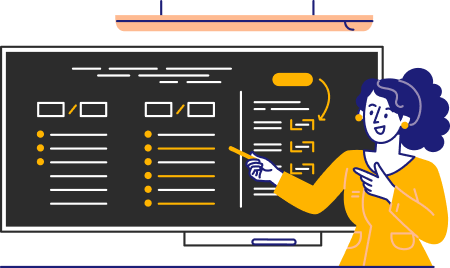
You’ve made it to the end, but don’t feel too overwhelmed or get lost in the weeds while striving to pinpoint the best parts of your experience and skillset to include in your summary! Return as often as you need to the summary examples above, and don’t hesitate to draw inspiration from our resume examples .
When you start writing your summary, keep our formula in mind:
X + Y + Z = Success!
X = Your characteristics/personality Y = Experience and quantified success/results Z = How your accomplishments apply to the specific role
Carefully read every job description while you search, and tailor your resume summary to each listing. The extra effort and finishing touches will show!
Remember it’s easiest to write your summary once you’ve drafted the rest of your resume , so you can get crackin’ in our resume builder for an interactive, intuitive solution. And if you like the resume below, you can start customizing it right away. So, here’s to your success. We’re cheering you on!
When crafting your document, be sure to include specific information from the job ad but only if you actually have that experience. Because the ATS will automatically search for appropriate keywords and phrases, you can readily find what employers are searching for in other resumes and the ad for the job you’re applying for. Also, look at other ads for similar positions to find industry-specific keyword information to include.
Senior Financial Analyst Resume
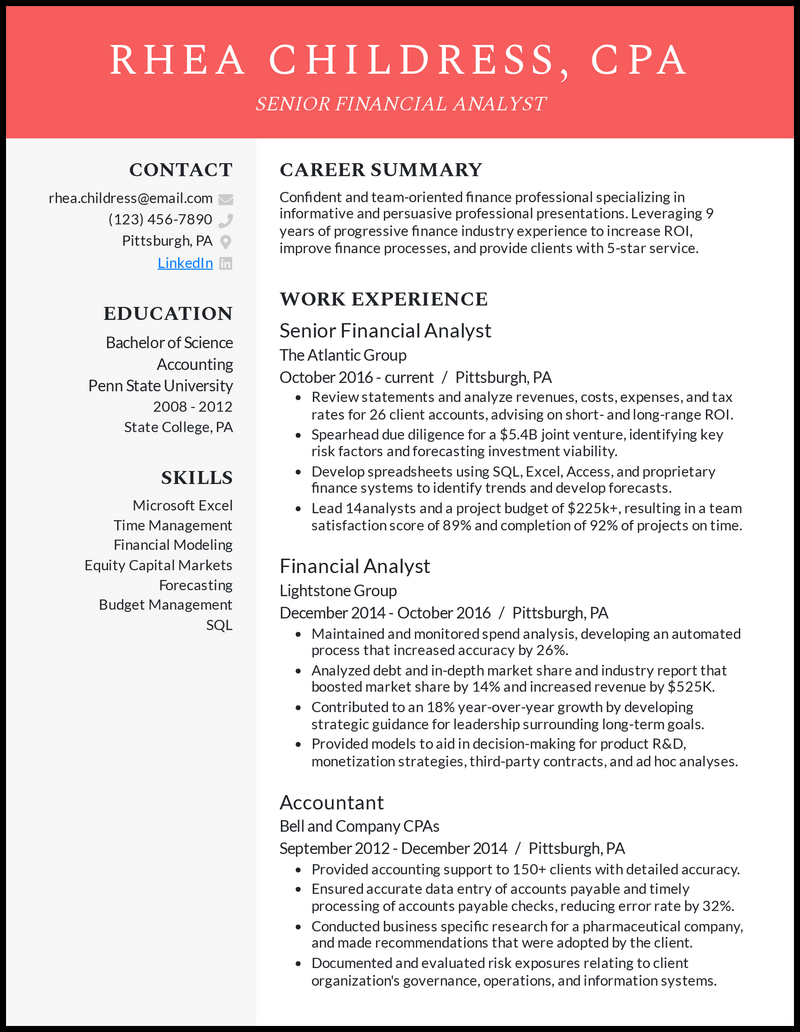
101 Essential Skills to Put on a Resume in 2024 [For Most Jobs]

Listing skills on your resume is fairly easy.
Listing the right skills in the right way is a little bit trickier.
Are you mentioning the right skills for the job, or are you boring the HR manager with irrelevant information?
The hiring manager for the software development team couldn’t care less about your expertise in marketing. What they’re dying to know, though, is your skill level in Python and how you get along with the team.
In this guide, we’re going to walk you through the process of putting skills on your resume from start to finish. We’ll explain how to identify the right skills and how to list them in a way that catches the hiring manager’s attention!
Here’s what you’re going to learn:
Hard Skills Vs Soft Skills - What’s the Difference?
- Why Should You List Your Skills on a Resume?
- 8 Best Skills to Put on a Resume
- How to List Skills on a Resume
- 120+ Skills to Put on Your Resume (For 10+ Fields)
New to resume-making? Give our resumes 101 video a watch before diving into the article!
Skills are divided into hard skills and soft skills .
To create an effective job application, catch the hiring manager’s attention, and land your next job, you should mention both hard and soft skills in your resume.
But what exactly is the difference?
Hard skills involve the technical knowledge or know-how one can gain through experience, training, or education. For example:
- Machinery skills. E.g., operating a road roller, pallet-stalker, forklift, etc.
- Software skills. Depending on the field, you need to know how to use different software, such as the Adobe Creative Suite for graphic designers or the Ableton Live Suite if you’re a DJ.
- Tools. Say you’re a digital marketer . You’ll need to know how to use tools like Stethoscope, Google Search Console, Google Analytics, Ahrefs, and the sorts.
- Multilingualism. The more customers you can communicate with, the more valuable you are as an employee. Some sought-after languages today include German, Chinese, Spanish, and Arabic.
- Computer skills . If you’re a web developer, your hard skills will likely include coding languages such as Python, C++, etc. Even if you’re not though, most jobs will require that you have at least some basic computer knowledge in MS Office and G-Suite, emailing and presentations, etc.
- Techniques. E.g. frequency analysis, Crystallization.
- Mathematics. Many professions, such as accounting and finance, require mathematical skills.
- Data analysis. Businesses are always looking for professionals who can gather and analyze data for various stakeholders, which makes data analysis a very in-demand hard skill.
…and just about any field-specific skill. While hard skills are essential to complete tasks in about any job, they’re also teachable and easily measurable.

Soft skills , on the other hand, are attributes and habits that describe how you work individually or with others. They are typically not job-specific but rather transferable skills that indirectly help you adapt to the work environment and company culture.
Some examples of the most in-demand soft skills include:
- Communication
- Problem-solving
- Organization
- Adaptability
Like hard skills, you can also learn how to develop soft skills, although it’s significantly harder.
While you can acquire computer skills through a technical course, you’ll need to work much harder to develop, say, your communication skills.
In the workplace, for example, you’d need to practice active listening , learn how to notice nonverbal cues, and practice your oral communication skills as much as possible.

What’s the Difference Between Hard Skills and Soft Skills
Here are the two main differences between hard skills and soft skills:
- How you obtain them. You can obtain hard skills through work experience , education, training, and certification. Soft skills, on the other hand, can be gained through life experience, both on and off work.
- How you use them. You apply hard skills directly to the job, whereas soft skills come into play indirectly and may often complement your hard skills. For example, you may be a communicative marketer or an office manager with great leadership qualities.
Why Should You List Skills on Your Resume?
The skills section is one of the 3 most important resume sections , with the other two being work experience and education sections.
If written correctly, the skills section looks something like this:

By now, you’re probably thinking “ how hard can this be, right? All I have to do is list all my skills and call it a day! ”
Well, not exactly. The process of putting skills on your resume is a bit more nuanced than that, and we’re going to tell you why.
Most companies nowadays use Applicant Tracking Systems to help them go through the hundreds and thousands of resumes they receive every day.

This software scans your resume for keywords relevant to the job you’re applying for, and if it doesn’t find them, the software automatically rejects the resume.
Say, for example, the job you’re applying to requires an Expert level in Java. If you haven’t mentioned Java as a skill on your resume, your resume can automatically get discarded.
In fact, 70%+ of resumes are rejected at this stage, never having even been seen by an HR professional.
And, even if the company doesn’t use an ATS, there’s a good chance that the HR manager is going to skim through your resume looking for the right skill set.
So, whether you’re doing this for the ATS or the HR, it’s important to mention the right skills .
Below, we’re going to explain just how to do this in the best way possible.
But first, let’s cover some of the best skills to mention in any resume, regardless of your profession.
8 Best Skills to Put on a Resume
Every profession requires some role-specific hard skills if you want to do it properly. An accountant, for example, needs to know math to do their job right, just like a photographer needs to know how to use photo editing software like Photoshop.
In most cases, it’s easy to identify such skills and understand whether you’re qualified enough for the job.
The right soft skills for a job may be harder to point out, but they’re just as essential in today’s job market - 93% of employers say “ soft skills play a critical role in their decision about whom they want to hire. ”
To give you an example, if you’re a project manager, you will need to have excellent organizational skills in addition to your project management skills. Or, if you’re a developer, you need to also be an apt problem solver.
You can find lists of field-related, relevant soft and hard skills later in the article, but for now, here are the top soft and hard skills valued by hiring managers in most professions :
#1. Communication skills
There are very few, if any, jobs out there that don’t require at least some level of communication skills.
Whether you’re a writer who needs to communicate a message to your readers, a marketing specialist who needs to communicate an advertising campaign to your client, or an office worker who must communicate with a colleague to complete a task, communication skills are vital.
Communication is a multi-faceted skill that includes several skills, such as:
- Oral and written communication
- Non-verbal communication
- Active Listening
- Presentation
- Public-speaking
- Negotiation
#2. Computer skills
By 2016, over 70% of US jobs required medium-to-high-level digital skills.
This means that computer and technical skills are priceless assets even if your job isn’t centered around technology. As such, computer skills are almost always a great addition to any resume.
Here are some valuable computer skills for every professional:
- Office suites (MS Office, iWork)
- Social media
- Database management
- Web (Internet savviness, basic HTML, CMS)
- Troubleshooting
- Equipment installation and configuration
- Fast Typing

#3. Management skills
Management skills are usually associated with management positions, but in reality, that’s not usually the case. Any type of professional can benefit from strong management skills.
In a nutshell, management skills involve being able to effectively handle people, resources, and processes, including your time, plans, projects, and so on.
Here are some of the most in-demand management skills:
- People management
- Project management
- Time management
- Risk management
- Action planning
- Conflict Resolution
#4. Problem-solving skills
Problem-solving means you’re able to identify problems successfully, find the root cause behind them, and come up with creative solutions.
Considering there isn’t a single job where you won’t face problems in one way or another, problem-solving skills are a great asset to have. When it comes to managerial, professional, and technical positions , problem-solving skills are essential.
Problem-solving is a set of skills that includes:
- Research skills
- Analytical skills
- Critical thinking
- Decision-making skills
- Attention to detail
#5. Organizational skills
Organizational skills are a set of soft skills that help you keep track of information, materials, and even your time in such a way that you can tackle short and long-term tasks efficiently.
Organizational skills are among the top skills recruiters are looking for in 2022, primarily because they help employees be more productive, save companies time and money, and facilitate a more positive work environment.
Here is what organizational skills consist of:
- Physical organization
- Prioritization
- Goal setting
#6. Leadership skills
Leadership includes both the ability to manage and inspire others. Managers are not always great leaders, but leaders almost always make good managers.
People who’re good at leading are emotionally intelligent, good communicators, and natural-born influencers. They can motivate others to reach their full potential and work together towards common goals. This makes leadership another great skill to have for many professions out there.
Some important soft skills related to leadership include:
- Relationship-building
- Strategic thinking
#7. Customer service skills
A big part of jobs out there involve dealing with customers.
From customer support representatives to cashiers, customer service skills are a great asset to have in 2024. Particularly, that’s because it encompasses a number of other valuable skills, such as:
- Persuasion skills
- Product knowledge
#8. Interpersonal skills
Interpersonal skills refer to how well you can understand and get along with other people.
It goes without saying that they’re extremely useful for team-oriented or customer-facing roles, as a big chunk of the work involves communicating with other people.
Such skills, however, are also useful for roles where you don’t get to interact as much with people.
Take, for example, writers. To be a really good writer, you need to be able to:
- Understand and communicate with your audience
- Collaborate with your publishing team
- Understand what people are like
Just like most other transferable skills on our list, interpersonal skills are multi-faceted. Here is what they consist of:
How to List Skills on a Resume (And Stand Out)
Now that you have a clear understanding of how important skills are - and how some are more relevant than others - let’s talk about how you should list them on your resume.
There are several things you need to do to stand out:
#1. Tailor Your Skills to the Job
Relevance is key; the customer service skills you acquired working as a server during college won’t come in too handy when you start work as, say, a data analyst .
So, the first thing you should remember is to only list skills that are useful for the job you are applying for . To find out what these skills are, you should scan the job listing.
Job ads usually list a set of requirements or skills they expect a good candidate to have. Make sure you don’t leave any of those out on your resume.
For example, imagine you are applying for a line cook position in a restaurant:
- “Here at ‘ABCD’ we are committed to creating a one-of-a-kind experience for our guests . Our French restaurant is looking for a professional line cook for the summer season to work directly under the supervision of our chef. Responsibilities include prepping and cleaning food, creating and cooking meals, and cleaning up the working area . Impeccable attention to detail in food cooking and presentation is needed.”
The underlined bits in this job description are the role’s responsibilities. By paying a closer look, you can understand that ABCD is looking for someone who:
- Is committed to excellence and is highly professional
- Works well under supervision, and with others
- Can prep, clean, and cook food
- Pays great attention to detail in cooking and presentation
Based on this, some of the skills you should definitely mention in your resume can include teamwork, attention to detail, communication, food prepping, and culinary skills.
As a given, you wouldn’t mention anything that isn’t directly related to the job. As a line cook, you’re not going to be using a lot of tech, so you wouldn’t include your computer skills in your resume (even though such skills are relevant for a ton of other jobs).
#2. Create a Skills Section
Once you’ve identified all the right skills to add to your resume, create a “Skills” section to list them under. This way, the hiring manager will be able to check whether you have the right skills more easily and the ATS software won’t disqualify your resume.

Here’s what you should remember while making this section:
- Be specific. “Verbal and written communication” sounds significantly better than “communication.”
- Sort your skills by relevance. Order your skills based on how critical they are for the role. More important skills go on top, and the nice-to-have ones go on the bottom.
- Don’t lie or exaggerate. It goes without saying that you should never, ever, lie about your skills. The employer will know you lied the moment you have to work on a task that requires that very skill.
#3. Match Each Skill With Your Proficiency Level
For each skill that you list on your resume, use the competencies proficiency scale to show your proficiency level:
- Beginner. You are just starting to learn or have not practiced the skill through experience (usually fresh graduates that only understand concepts through theories or classroom experience).
- Intermediate. You have applied the skill in practice, and require assistance with it on rare or special occasions. You still have room to grow.
- Advanced. You know your stuff! You don’t need help with the skill anymore. You can also teach beginners how to use it.
- Expert. You are a recognized authority on this skill, the go-to person if anyone has any questions. You have consistently proved to be excellent in this skill. You could even write a whole book about it!
#4. Back-Up Your Skills in Other Resume Sections
Listing your skills in a separate section will only get you so far. After all, everyone else is also doing exactly the same thing.
To take your resume from good to great, you want your most critical skills to “pop” from the get-go and to prove to the hiring manager that you actually possess them.
Here is where the resume summary and work experience sections come in.
The resume summary is a short, 2-3 sentence-long summary of your resume that, done right, shows hiring managers your strongest points as a candidate the moment they lay eyes on your resume.

Positioned right under your contact information section , this is the first place where you can mention that you possess one or two of the most role-critical skills listed in the job description.
Here’s how the resume summary of the line cook example we mentioned above would look in practice:
- Detail-oriented line cook with over 5 years of experience prepping and cooking over 200 Mediterranean cuisine recipes. Collaborative professional who puts the needs of the team first. In my last position, was able to help the chef handle rush hour work of over 100 tables with 100% accuracy and approval rate from our customers.
Once you’ve grabbed the hiring manager’s attention by including your top skills on your resume summary, it’s time to prove that you have them .
The best way to do that? List some accomplishments in your work experience section and explain how utilizing a particular skill helped you achieve them.
Here’s how that would look like in practice:
- Prepped and helped cook food for over 500 customers in the past two years, receiving high praise and positive recommendations for the restaurant continuously.
- Helped restaurant to receive positive reviews for 3 years in a row from Gastronomica magazine for attention to detail and food aesthetics and presentation.
#5. Put Transferable Skills to Use
If you’re an entry-level candidate or if you’re switching careers , you should definitely put transferable skills to use. Transferable skills are not directly related to the job you are applying to but are still useful, as well as relevant to most jobs.
Let’s say, for example, that you’re going for a career change from sales to copywriting. You can benefit from listing at least some of the skills acquired in sales in your copywriter resume , such as:
- Written communication. Both roles involve communication via text. A salesperson needs to send cold emails, while a copywriter has to write newsletter emails.
- Persuasion. A copywriter needs to create copy that drives sales, while a salesperson needs to be persuasive in person.
- Computer skills. Both jobs require some degree of computer knowledge. For a salesperson, that’s using Customer Management Software, while for a copywriter, that’s publishing content online.
150+ Must-Have Skills (for Every Field)
Are you still not sure which skills to mention in your resume? We’ve got you covered.
We compiled a list of some of the most relevant skills on the market in 2024, for all sorts of different fields!
If you happen to possess some of these skills, make sure to mention them in your resume. If not, it’s never too late to learn something new!
#1. Soft Skills
Soft skills are essential for just about any job out there. While they’re not necessarily critical to doing your job well, they ensure that you get along with your coworkers and foster a positive work environment.
When evaluating two candidates with equal hard skills, the hiring manager is always going to pick the one that has better soft skills.
So, it’s very important to mention your soft skills in your resume.
Here are some of the most in-demand soft skills today:
- Effective communication
- Emotional intelligence
- Conflict management
- Teamwork skills
- Stress management
- Productivity & Organization
#2. Marketing Skills
With new technologies developing faster than ever, it becomes essential to move beyond the basics of traditional marketing. Here are some of the most relevant marketing skills these days, including both cutting-edge online tools, as well as classic marketing skills:
- Data analysis
- Web analytics
- Email marketing
- Web scraping
- CRO and A/B Testing
- Data visualization & pattern-finding through critical thinking
- Search Engine and Keyword Optimization
- Project/campaign management
- Social media and mobile marketing
- Paid social media advertisements
- B2B Marketing
- The 4 P-s of Marketing
- Consumer Behavior Drivers
- Brand management
- Copywriting
- Storytelling
#3. Management Skills
As a manager , you need to have the right mix of soft and hard skills.
Below are the management skills needed to not only get the job but to also enhance employee and company productivity in the long run.
- Six Sigma techniques
- The McKinsey 7s Framework
- Porter’s Five Forces
- Emotional Intelligence
- Dealing with work-related stress
- Task delegation
- Technological savviness
- Business Development
- Strategic Management
- Negotiation
- Proposal writing
#4. Sales Skills
The art of selling has stayed the same despite technological advancements. Humans still strive for contact with other humans. Despite channels of communication becoming digital, communication and empathetic skills take priority in the sales industry.
A comprehensive must-have skill list for salespeople includes:
- Customer Relationship Management (CRM)
- Cold-calling
- Public speaking
- Lead generation
- Buyer-Responsive selling
- Buyer engagement
- Effective communication and sociability
- Social media/digital communication
#5. Design Skills
Today, knowing the basics of design does not suffice anymore. To get hired as a designer, you must know how to create killer branded content for the web and for social media channels.
Some of the most important design skills for your resume are:
- Adobe Creative Suite: Illustrator, InDesign, Photoshop
- Dreamweaver
- Infographics
- Photo Editing
- Typography: spacing, line height, layout, choosing fonts
- Storyboarding
- Targeting and marketing through visual communications
- Logo creation
- Digital printing
- Integration of visual communication in social media platforms
- Attention to detail & aesthetics
- Interactive media design
- Color sense & theory
- Active listening
#6. Basic Technical Skills
These are skills that almost everyone working in an office should know. You can put these skills on your resume if you are applying as a secretary, office clerk, or any other type of office employee.
The basic technical office skills include:
- Microsoft Office Pack: Word, Excel, Access, Publisher, Outlook, Powerpoint
- Filing and paper management
- Bookkeeping through Excel or TurboTax
- Research and data analysis
- Basic knowledge of user interface communication
- Technical writing
- Cloud networking and file sharing
#7. Accounting & Finance Skills
Goodbye, filing by hand. Hello, countless platforms and apps. Accountants and financial specialists should familiarize themselves with these skills in order to have a successful career:
- Microsoft Excel (Advanced)
- Enterprise Resource Planning
- Big Data Analysis & SQL
- Know Your Customers (KYC)
- Cognos Analytics (IBM)
- Visual Basic
- Accounting Software
- Revenue recognition
- Anti Money Laundering
- Clear communication
- General business knowledge
- Numerical competence
#8. Education Skills
How many times have you witnessed a 50-year-old honorary doctor with three PhDs struggle to play a YouTube video during undergrad or grad school? Teaching methods have evolved, and so have the required skills to be part of the education industry.
Some of the most essential educational skills are:
- Updated curriculum knowledge
- Research & Data analysis
- Educational platforms (software like Elearn)
- Technological & digital literacy
#9. Web Development Skills
It seems like there’s new technology popping up every other second now, a good enough reason for web developers to keep updating their skills.
That said, if you are proficient in HTML, CSS, and Java, you pretty much have a leg up on the competition. All other skills on this list derive from or build upon the three basic programming languages. You can learn or improve your web development skills here.
- CSS preprocessors
- Graphic User Interfaces (GUI)
- Git/Version control (Github, GitLab)
- Search Engine Optimization (SEO)
- Application Programming Interface (API)
- Adobe Photoshop, InDesign
- Content Management Systems (CMS)
- Testing/Debugging
- Responsive design principles
#10. Business Analytics
BAs are very in demand right now by businesses, and for a good reason! They perform an almost magical task of analyzing past and present data to give future predictions. To perform their magic, they need some analytical spells:
- SQL (a must) and Hive (optional)
- Programming language (R, Python, Scala, Matlab)
- STATA, SPSS, SAS
- Data Mapping
- Entity Relationship Diagrams
- Big Data tools
- Microsoft Visio
- Agile Business Analysis
- Machine learning
- System Context Diagrams
- Business Process Modeling
- Technical and non-technical communication
#11. Nursing & Healthcare Skills
More than any other profession, healthcare professionals need to stay constantly updated with new technologies, medicine, and techniques. The skills nursing requires are countless and specific, but the most basic ones boil down to:
- Mathematics
- Patient care and assistance
- Paperwork/record-keeping abilities
- Advanced Cardiac Life Support (ACLS)
- Physical endurance
- Infection control
- Surgery preparation
Bonus Infographic: Skills to Put on a Resume

Frequently Asked Questions
Do you still have some questions about what skills you should put on your resume (and how)? Check out the answers below:
1. What kind of skills should I include in my resume?
Your resume should include a combination of two types of skills: hard skills and soft skills .
Hard skills involve job-specific skills that are acquired through education, training, or work experience, while soft skills involve personality traits that can be indirectly useful at the workplace and help you adapt to the company culture better.
Depending on your industry, some examples of hard skills you can list on your resume include copywriting, database management, graphic design, multilingualism, public speaking, SEO, etc.
Meanwhile, examples of soft skills are communication, creativity, leadership, teamwork, time management, conflict resolution, etc.
2. What top skills do employers look for?
The top hard skills recruiters are on the lookout for include blockchain development, SEO, virtual reality development, data analysis, artificial intelligence, business analysis, Java development, affiliate marketing, UX design, machine learning, project management, video production and editing, sales, and business development.
The top soft skills hiring managers are looking for , on the other hand, are creativity, collaboration, persuasion, adaptability, and emotional intelligence.
3. How can I identify my skills?
Some effective ways to identify your skills before adding them to your resume include:
- Consider your achievements. Did you ever get recognized for a specific achievement? What skills helped you do it? You are probably still skilled in those areas.
- Ask friends and coworkers. Sometimes, it’s easier for others to recognize the strengths that you don't see. Colleagues can definitely be of help but if you’re fresh into the professional world, former professors and classmates can also give you some insight.
4. Where do skills go on a resume?
Skills go under a separate ‘Skills’ section on a resume, typically placed right below, or on the side, of the work experience section.
That said, you can further prove that you possess the skills you list in this section, by weaving the most relevant skills for the job in other resume sections, such as the resume summary and the work experience sections.
5. How many skills to include in my resume?
The number of skills to add to your resume depends on the job you’re applying for, as well as your level of expertise and work history.
If you’re a seasoned professional with plenty of work-related skills, you should definitely include them in your resume. Also, if the job you’re applying for requires a number of skills you possess, it’s safe to include them all in your resume.
As a rule of thumb, listing up to ten skills on your resume is typically a safe choice, as long as they don’t make your resume spill over to page 2 .
6. What are the best skills for a candidate with no experience?
Candidates with no experience and few job-specific skills can benefit from adding transferable skills to their resumes. These are skills that can be applied to many jobs across several industries.
Some examples of good skills for a no-experience resume include communication, organization, problem-solving, teamwork, adaptability, work ethic, and computer skills.
7. What’s the best way to list skills on a resume in 2024?
To really impress with your skills in 2024, don’t just list some random skills under a separate section and call it a day! Instead, make them more credible by:
- Finding out more about the company culture.
- Tailoring your skills to the job description.
- Mentioning the most critical skills on your resume summary or resume objective .
- Using your achievements to explain exactly how you used your skills to your advantage.
Key Takeaways
Let’s sum up everything we’ve learned about putting skills in your resume:
- You must have a section in your resume devoted entirely to your skills. This helps you pass through applicant tracking systems and get noticed by the HR manager.
- The differences between hard skills and soft skills are in the way they are applied (directly vs. indirectly) and the way they are obtained (through education and practice vs. personality traits and experience)
- On your resume, list only skills that are relevant to the job, scan the job listing for must-have skills and list those (if you have them), pair each skill with a responding proficiency level, back up your skills with other resume sections, and mention transferable and universal skills.

To provide a safer experience, the best content and great communication, we use cookies. Learn how we use them for non-authenticated users.
More From Forbes
30 powerful resume keywords to beat ats in 2024.
- Share to Facebook
- Share to Twitter
- Share to Linkedin
Using the right resume keywords ensures you are able to shine a light on your skills and experience
More than 90% of employers use an applicant tracking system (ATS) to initially filter out or rank middle-skilled and highly-skilled candidates for job postings, according to a 2021 global study conducted by the Harvard Business Review.
This means that there is at least a 90% chance that your resume will not make it past the screening software.
Applicant tracking systems rely on keywords to assess candidate suitability—and these keywords are the ones that are located within your resume. The problem is, many candidates do not know how to make a resume effective because they fail to include the most appropriate keywords for their industry and role they are applying to. Consequently, they never (or hardly ever) make it past the screening stage to secure an interview.
While there are several factors that determine whether your resume makes it past the ATS or not (although a few are beyond your control), knowing what skills to put on your resume and which resume keywords to include, are a few of the most critical steps you can take to ensure your resume beats ATS.
Why Use Resume Keywords?
"A recruiter will never see that candidate’s application, even though it might fill all of the employer’s requirements," continued the HBR study. Therefore, being the perfect fit for a role is not good enough. You might tick every box and fulfil all the requirements listed on the job description, yet fall short of being shortlisted for the role, all because your resume did not effectively evidence the criteria and skills the employer is looking for.
Here is a simplified example of how an ATS works from a recruiter's point of view:
- You send your resume through a job portal.
- When the recruiter is sifting out 1,000 applications, they'll enter a skill such as "project management," "Power BI," or an education requirement such as "MBA," from the job description.
- This filters available resumes to 300 candidates.
- If your resume is optimized to include the keyword they are looking for, it will show up; if not, it will never be seen and you've just lost the potential to land a career-boosting opportunity to an AI-powered gatekeeper—ATS.
Best High-Yield Savings Accounts Of 2024
Best 5% interest savings accounts of 2024.
Matching keywords is an essential step to take before sending an application, or you could risk ... [+] being sifted out at the screening stage
Where To Find Keywords To Put On Your Resume
There are number of sources you can use to find keywords for your resume. The first and most obvious of them is the job advert itself. Taking a careful look at the job description, and the key requirements/person specification/ideal candidate section, carefully identify what are the core requirements that the employer is asking for.
You might find it useful to undertake a keyword highlighting exercise by copying and pasting the entire job description and person specification into a Word document, and highlighting the technical and soft skills that stand out to you the most, which are relevant to what you already have to offer.
For example, take a look at this sample job description from Workable for a cost analyst role:
"We are looking for a cost analyst to help us audit our expenses and find ways to make our operations more cost-efficient. You’ll be the go-to person for cost analysis and you’ll get to prepare reports to help management make better decisions. To do this job well, we’d like you to be well-versed in data and financial analysis, and have strong attention to detail. Ultimately, your job will be an integral part of our efforts to ensure profitability and business success."
It then proceeds to list the following responsibilities for the cost analyst role:
- Gather and analyze financial data
- Determine standard costs and investigate variances with actual costs
- Prepare detailed reports, both periodically and ad-hoc
- Help management make important decisions based on costs and benefits (e.g. investments, market growth, pricing changes)
- Create and manage budgets, and monitor spending
- Conduct audits on financial processes and transactions
- Monitor changes in processes or methods to calculate effects on overall costs
- Estimate product costs for existing and new products
- Forecast and analyze costs of processes, labor and inventory
- Suggest cost-reducing or profitable solutions
- Conduct market research to support future business planning
And then the advert proceeds to list requirements and skills for the role (pay close attention to this):
- Proven experience as a cost analyst, cost specialist or similar role
- Experience in data, operational and financial analysis
- Knowledge of accounting processes and software
- Strong analytical skills
- A business acumen
- Great attention to detail
- Good communication aptitude
- Degree in Finance, Accounting or similar field
- Certified Public Accountant (CPA) preferred
With the above job advert, how many keywords can you easily identify?
Considering the above data, some of the likely resume keywords and skills used for the job posting above, which you would want to incorporate into your resume for a cost analyst role, include:
- Certified Public Accountant (CPA)
- Good communication
- Attention to detail
- Cost analyst
- Accounting processes and software (and name a few)
- Financial analysis/Analyzing financial data
You can incorporate these keywords into your professional summary, skills highlights, and work experience and education sections.
ChatGPT can help you analyze a job description quickly and can even provide guidance on how to ... [+] tailor your resume for that specific role
How To Use ChatGPT To Find Resume Keywords
One time saving method you could employ to find keywords from the job advert and interspersed them throughout your resume, is to solicit the help of ChatGPT. ChatGPT is an AI-powered chatbot developed by OpenAI, that has millions of users around the world—with one of the fastest, unprecedented technology adoption rates in history.
It uses LLM (large language models) to engage with you as any other human being would, providing you with timely information and shortening the length of time it takes to accomplish administrative and content writing tasks. While it is not wise to use ChatGPT to draft an entire resume for you on its own, it certainly can be helpful at key junctures in the resume writing process, for example, when analyzing and inputting keywords.
To use ChatGPT to find the best keywords to include in your resume, follow the below steps:
- Provide ChatGPT with a copy or excerpt of a job description for the role you want to apply for, and then prompt: "I am tailoring my resume to apply for this role. Please select and suggest keywords and phrases from this job advert that I can put into my resume. Include any technical skills, software tools, certifications, industry terminology, and soft skills listed in the advert."
- Now that ChatGPT has provided you with a list you can then begin incorporating these words and phrases throughout your resume, ensuring you proofread with each edit so it reads naturally and doesn't give the appearance of meaningless keyword stuffing.
Powerful Keywords To Include In Your Resume
Now that you have this background understanding, here is a sample list of some of the most common and essential keywords you should consider adding to your resume, for three specific industries—information technology, healthcare, and sales. These are categorized for ease of navigation and will provide you with an idea of what to look out for, as relates to your industry:
Resume Keywords For The Information Technology (IT) Industry
- Programming languages (e.g., Java, Python, C++)
- Cloud computing
- Network administration
- Agile methodologies
- ITIL (Information Technology Infrastructure Library)
- Artificial intelligence (AI)
- Machine learning
- Data analytics
- IT project management
Resume Keywords For The Healthcare Industry
- Electronic Health Records (EHR)
- Clinical research
- Medical billing and coding
- Telemedicine
- Healthcare compliance
- Health informatics
- Medical imaging
- Healthcare quality improvement
- Health insurance
- Healthcare technology
Resume Keywords For The Sales Industry
- Business development
- Account management
- Client relationship management (CRM)
- Lead generation
- Prospecting
- Sales cycle
- Pipeline management
- Value proposition
- Sales forecasting
- Competitive analysis
Keywords include a range of technical skills, soft skills, and education requirements—and even your ... [+] years of experience
Using the right keywords can help you effectively sell yourself and shine as a star candidate to employers, ensuring your skills and experience do not go to waste or escape their notice. Through highlighting your expertise in this way (without keyword stuffing) you increase your chances of securing an interview.

- Editorial Standards
- Reprints & Permissions

COMMENTS
Below your professional summary, include a 'summary of skills' section. Alternative titles for this section could be 'core competencies', 'key skills', 'professional skills', or 'relevant skills'. If you have less than 10 skills, you can list them out in columns. Summary of skills resume example (less than 10 professional ...
Their hard skills include all the clinical competencies required to perform the job of nursing, while soft skills may include communication and integrity. These are among the best skills a nurse could list on their resume: Hard skills. Soft skills. • Patient assessment. • CPR and BLS skills.
A resume summary is more appropriate if you have some work history and various skills and experiences worth highlighting. For example, a recent high school graduate applying for a nursing program may want to include a resume objective in their summary: Motivated nursing student seeking to develop experience working with elderly patients.
5. Marketing Manager Professional Summary Example: Marketing Manager with over eight years of experience. Proven success in running email marketing campaigns and implementing marketing strategies that have pulled in a 20% increase in qualified leads. Proficient in content, social media and inbound marketing strategies.
Start your resume summary with a positive character adjective, then mention your job title, years of experience, and your expertise. Follow with examples of career accomplishments and key skills relevant to the job. It's easier to write a good summary for a resume when your other resume sections are completed.
Here are 10 resume summary examples written by candidates with little or no relevant work experience to give you an idea of how to write your own professional summary: Childcare. College student. Computer science. Digital marketing. Food service. High school student. Internship. Nursing student.
A well-written resume skills summary is a great way to try to achieve this. The second point to consider is if a resume skills summary will be useful. You'll make your way through a few levels in the job application process, which serve as your audience. The following shows if a resume skills summary will come in handy. The applicant tracking ...
A resume summary, also known as a professional summary or resume summary statement, is a concise overview of your experience and top skills. Positioned at the top of your resume, just under your contact information, it introduces your resume in a three- to five-sentence paragraph.
Just follow these steps: 1. Begin with your years of experience and job title. Start your summary by mentioning your years of professional experience and your current or target job title. This sets the stage for your key skills and achievements. 2. Highlight your key skills and achievements.
Office Manager Resume Summary. "Office manager with 5+ years of experience in controlling inventory, ordering and tracking new supplies, developing procedures and training material for staff. Strong communication skills, organized, with a track record of success.". Read the full office manager resume example here.
2. Include Relevant Skills in a Separate Skills Section. Help recruiters spot strengths on your resume in a flash by creating a standalone skills section where you put your most important qualifications. Make sure to: Be precise ("Written and verbal communication," instead of "good communicator").
7. Writing. Even in today's tech-heavy world, good writing skills are still necessary for communication, executing marketing campaigns, assembling documentation and creating presentations. Good skills to put on a resume for this ability include: Content writing. Editing.
Step 6: Customize for Each Application. Align your resume summary with the job's key requirements. Highlight the aspects of your experience and skills most relevant to the position. For example, if the job emphasizes leadership skills, ensure your summary showcases your experience leading teams or managing projects.
Skills-based resume example. The following is an example of a skills-based resume for a sales representative: Charles Bradshaw. (555) 475-8755. [email protected]. 12207 White Circle, New York City, New York 41789 Qualifications summary. Proven record of increasing monthly sales by 15%.
Here are 12 of the most popular industry-specific hard skills to list on your resume: 1. Design. Companies in nearly every industry need creatives with a strong sense of design to help them develop attractive products and content. Specific examples of design-related hard skills include: UI/UX design. Photography.
Here's a quick way to get started. 1. Make a List of the Skills You Know You Have. As mentioned above, the easiest way to get a grip on your current skills is to reflect on your academic and professional experiences. Consider the tasks you've taken on, the training you've completed, and the courses you had in school.
17. Scrum master resume summary. Scrum Master job description key points: Excellent ability to lead, communicate, and collaborate with a team to meet goals while maintaining Scrum values. Thorough understanding of Agile frameworks and ability to coach teammates in Agile.
A resume summary is a short professional introduction at the top of your resume that highlights your skills, qualifications and experience. Including a two-to three-sentence summary makes it easier for your potential employers to decide if they should read the rest of your resume.
Your summary of professional skills and resume objective aren't to be confused. The latter is a simple statement in one-two sentence that demonstrates your value and job-getting motivation, whilst your career summary is a bulleted list of your top achievements, skills, experience, and qualifications that are relevant to the job at hand.
You can put these skills on your resume if you are applying as a secretary, office clerk, or any other type of office employee. The basic technical office skills include: Basic Technical Skills Examples. Microsoft Office Pack: Word, Excel, Access, Publisher, Outlook, Powerpoint. Filing and paper management.
A skills-based resume, also known as a functional resume, is a resume that focuses more on your most relevant job skills than on your professional experience. Skills-based resumes are recommended for unique career situations, such as changing careers, having significant gaps in employment, and targeting jobs unrelated to your work experience.
1. Demonstrate an impressively rare skill set. One of the best ways to send a hiring manager to sleep is to include the same resume skills as every other candidate. When they read the words communication skills for the tenth time, they will mentally pigeon-hole you with all the rest of the average candidates.
A resume personal statement should include: Between 50 and 200 words in 3 - 4 sentences. Your title or function, for example "Junior developer" or "Passionate hospitality manager". An opening hook. Soft skills and hard skills. Impressive facts and stats. Your short and/or long-term goals.
The top 10 skills highlighted, which you can put on your resume, are: 1. Creative Thinking. Employers need workers who are willing to think outside the box and are confident enough to voice their ...
Here are 10 hard skills examples you should have on your resume for a content or writing role: Ability to conduct thorough research and fact-checking for accurate and credible content. Basic understanding of web development languages, such as HTML and CSS for formatting online content.
Calculating. Modeling. Extrapolating. Predicting. Forecasting. Investigating. Surveying. Statistical analysis. Learn how the skills you put on your resume affect how employers view your candidacy and review a list of 120 skills that might describe your qualifications.
Key skills can be strategically placed at various points throughout your resume. getty. 3. Leadership. Leadership skills is one of the core skill sets that you need to prove to employers, whether ...
27 adjectives to describe your conscientiousness. Highlighting your work ethic, organizational skills, and problem solving abilities is a great way to show hiring managers that you'd be a dedicated employee: Diligent. Attentive. Responsible. Enthusiastic. Industrious. Keen. Observant.
Using the right resume keywords ensures you are able to shine a light on your skills and experience. getty. More than 90% of employers use an applicant tracking system (ATS) to initially filter ...